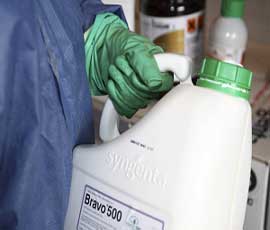EU illegal pesticides warning

A surge in sales of counterfeit pesticides is putting farmers, land and produce across Europe at risk, European Union crime intelligence agency Europol has warned.
The agency said more than 25% of pesticides circulating in some member states originated from an illegal market worth billions of euros each year.
Counterfeit sales were also rising around the world as more organised crime rings got involved, often exploiting legal pesticides companies.
The warning came as Europol called on the EU to carry out a study on how to improve traceability of hazardous materials used in the production of illegal pesticides.
Announcing its own series of EU-wide investigations to try to intercept illegal shipments during the ‘importing season’ of January and February, it also recommended a review of laws governing pesticide sales.
“The exceptional ‘low risk – high profit’ margin, combined with the lack of harmonisation in legislation and implementation, make this a fast-growing area of organised crime,” the agency said in a statement.
“Such illegal pesticides threaten the health of farmers and consumers and pose a risk to the natural environment.
“Furthermore there is a risk that illegal pesticides can be used as precursors for home made explosives due to the lack of traceability.”
Søren Pederse, Europol spokesman, said the trade in illegal and counterfeit pesticides was organised by sophisticated crime networks which had developed global supply networks and exploited legal companies.
“Organised crime groups are so well structured and so professional that wholesalers are unaware they are buying counterfeit products,” he said.
Many counterfeit pesticides sold across the EU appeared to violate safety standards and could include banned chemicals that disrupted the endocrine system and the production of hormones.
While the majority of farmers unwittingly used counterfeit products, Hans Muilerman, chemicals officer for the Brussels office of Pesticide Action Network, said some farmers knowingly bought them as they were cheaper and more powerful.
“The enforcement is so unbelievably weak in some countries and doesn’t exist in others and the farmers keep going on buying it,” he told EurActive.
Europol did not specify which member states had been most affected by the illegal trade, but it said it had intercepted shipments of banned substances in Eastern Europe.
The Association of European Businesses in Moscow said Russia had been a victim, with some counterfeit supplies sold there originating in western European ports.
The association said illegal suppliers fraudulently used packaging and trademarks from agribusiness and chemicals companies including Syngenta, BASF, DuPont and Dow.
